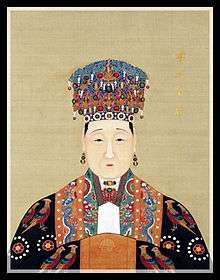Empress Dowager Xiaoding

Xiaoding, born as Li (1544-1614), was the mother of the Wanli Emperor. She was the nominal Regent of China during the minority of her son from 1572 to 1582. During her lifetime her name was Li, but she became known in history under her posthumous name, Xiaoding.
Life
Li was the daughter of the pauper Li Wei (d. 1584). She became a servant girl at the Imperial Palace of the Longqing Emperor, where she was eventually promoted to concubine. In 1563, she gave birth to a son, who was declared crown prince. Because of her success, her father was ennobled. Her social career was not unusual during the Ming dynasty, were several empresses, consorts and concubines came from a poor background and made a similar career. She herself was described as humble and submissive, acting in accordance with the female ideal of her time.
In 1572, her son succeeded to the throne at the age of nine. She was given the title of Empress Dowager and, in accordance with tradition, named regent during the minority of her son. Her position of regent was, however, never anything other than nominal, as she played not part in state affairs, which was entirely in the hands of Zhang Juzheng. Her son's de facto rule did not begin until after the death of Zhang Juzheng in 1582. Socially, however, her nominal position of regent gave her great prestige and status. She supported the reforms of Zhang Juzheng, and was given some of the credit for the prosperity of these years.[1] From 1572 until 1578, she lived, on the request of officials, in the palace of the emperor rather than the empress dowager palace, to supervise his life and daily habits.[2] She was strict with him and punished him if he, for example, refused to study. She is known to have built many Buddhist temples.
When her son was to appoint his eldest son heir to the throne, but hesitated because his mother was a palace woman, she pointed out to him that he too was the son of a palace maid, and the appointment when through.[3]
Legacy
During the following centuries, Xiaoding was, alongside Xiaozhuang, viewed as a model image of loyalty in the service of her dynasty and used as a role model in the influential moral book Huang Ming tsu-hsün-lu.
References
- ↑ Lily Xiao Hong Lee, Sue Wiles: Biographical Dictionary of Chinese Women, Volume II: Tang Through Ming 618 - 1644
- ↑ Lily Xiao Hong Lee, Sue Wiles: Biographical Dictionary of Chinese Women, Volume II: Tang Through Ming 618 - 1644
- ↑ Lily Xiao Hong Lee, Sue Wiles: Biographical Dictionary of Chinese Women, Volume II: Tang Through Ming 618 - 1644
- Hsieh Bao Hua: Concubinage and Servitude in Late Imperial China